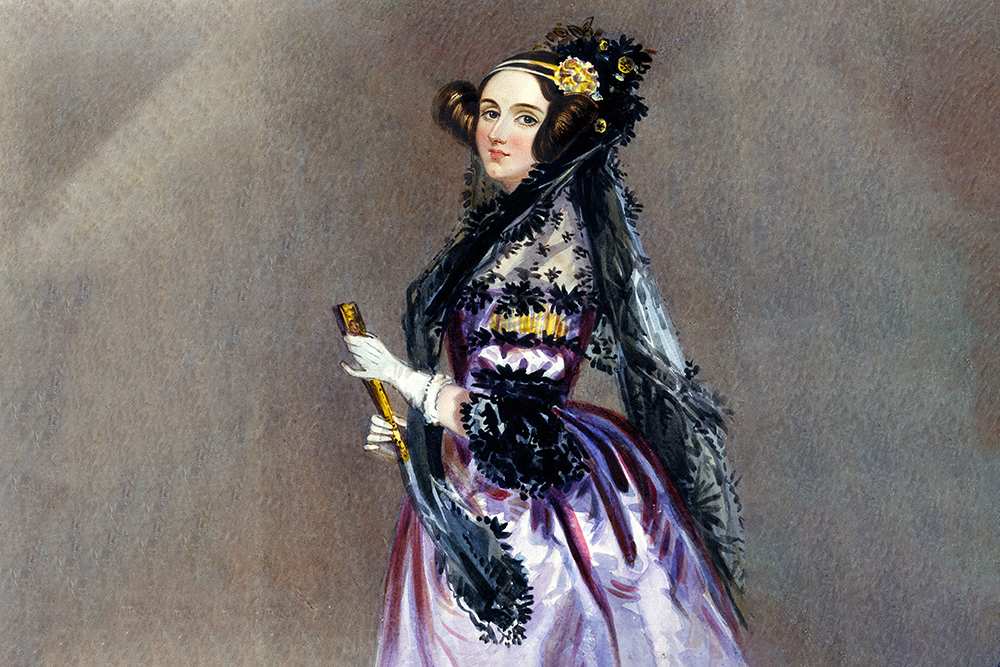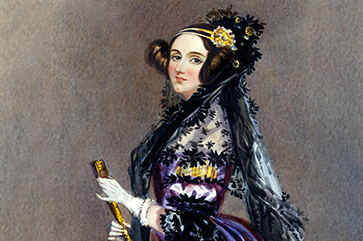Q&A Spotlight: Jessica Cook
How this UCLA doctoral candidate in English used big data tools to make a difference

Jonathan Riggs | June 26, 2023
Many were inspired at UCLA and beyond by how Jessica Cook, a UCLA doctoral candidate in English, reclaimed the impact and very words of Ada Lovelace, the world’s first computer programmer. Cook graciously agreed to answer a few more questions from the UCLA College about her work.
Can you briefly explain what was involved in your work with the Ada Lovelace archive, especially how you approached this like a big data project with AI tools?
I became interested in the Ada Lovelace archive as part of my dissertation project, which examines how 19th-century mnemonics and poetry informed the conceptualization of modern computing. In addition to being a mathematician and computing pioneer, Lovelace — the daughter of famed Romantic poet Lord Byron — was an aspiring writer and poetess who saw herself as the heiress of her father’s literary talents. I wanted to examine how her creative writing may have informed her revolutionary contributions to modern computing.
But because the vast majority of Lovelace’s papers remain unpublished, finding additional primary material necessitated travelling to the Bodleian Library at Oxford University (through the generous assistance of the UCLA Lenart Travel Fellowship) to research in the archives. Once there, I soon realized that it would be impossible to find what I was looking for without searching through the entire archive. Archives generally categorize material based on date or correspondent, and Lovelace’s poetry and literary writing was scattered throughout her papers and her correspondence to multiple people over many years. Virtually all of these documents are handwritten, and 19th-century handwriting produced by multiple correspondents is very difficult to skim through quickly.
Faced with these difficulties, I decided to photograph all of the papers in the archive and transcribe them when I returned home. This process left me with roughly 15,000 documents related to Lovelace and her circle, which would have taken many years for me to transcribe on my own. I began researching technology solutions to this dilemma and came across Transkribus, a transcription software that uses AI to machine-read historical documents and run keyword searches. Using Transkribus, I trained an AI model to read Lovelace’s handwriting specifically, using a base model created by University of London researchers on the handwriting of utilitarian philosopher Jeremy Bentham.
I am in the process of running my model on her entire corpus of writing, with plans to train additional models specific to the handwriting of important correspondents like her mother, Lady Noel Byron; her husband, William King, Earl of Lovelace; and fellow computing luminary Charles Babbage. This work will eventually enable researchers like me to access and analyze her entire corpus for the very first time.
How does Lovelace and her work represent an interesting intersection between the humanities and big data/AI?
In and of itself, this kind of large-scale digital humanities endeavor is an exciting demonstration of how AI has transformed the field of literary study. However, this particular project is especially poignant because Ada Lovelace’s contributions to the history of computing were the genesis of the very AI technologies that make this research possible. If Lovelace had not produced the very pieces of writing that I am transcribing, it is possible that the modern computer as we know it may also not have existed.
Crucially, Lovelace was the first person to realize that computing machines could produce more than just calculations. She envisioned the Analytical Engine — a machine invented by her collaborator Charles Babbage that scholars recognize as the precursor to the modern computer — as weaving together numbers like fabric and composing music.

Thinking about this intersection, what would you like everyone to know about the 19th-century literary history of computing?
The Victorian history of computing was much more diffuse, circuitous and altogether wild than traditional technological histories have represented. Although it may seem anachronistic to discuss computing a hundred years before the modern machine we call “the computer” existed, the concepts that underlie the physical technology did not appear out of nowhere. As my dissertation traces, computing concepts like random-access memory, executable programming languages and universal machines have their modern origins in 18th-century Scottish philosophy, but were fundamentally shaped by mnemonics lectures that took place in crowded and rowdy Victorian exhibition halls.
This bottom-up history of computing, as I tell it, includes famous writers like Jane Austen, Samuel Taylor Coleridge and Lewis Carroll; Victorian mathematical code poetry; working-class radical spies and slavery abolitionists; and even a machine that wrote poetry in Latin hexameter. Widening the history of computing to include these kinds of stories produces a completely different understanding of the forces that shaped big data and AI today.
What would Lovelace — the world’s first computer programmer — have thought about the big data world in which we live?
While I couldn’t claim to speak for Lovelace, reading through her letters and personal writing has given me some special insights into how she viewed the world.
Lovelace’s observation that computing machines can only perform the tasks that they are programmed to do (in a famous passage that Alan Turing later called “Lady Lovelace’s Objection”) arguably makes her the first modern philosopher of artificial intelligence. Given this keen recognition of the social forces that shape computational technology, her personal investment in female empowerment in STEM fields and her upbringing in a committed abolitionist household, I think she would have been very invested in current conversations about racial and gendered biases in contemporary AI technologies and digital infrastructures.
I also think her optimism about the immense benefits of AI technology would be qualified by her deep philosophical and humanistic interests in free will and the necessary boundaries for creativity. As she keenly understood the Sisyphean dangers posed by revolutionary mechanical innovations, Lovelace would have been very invested in the current conversations about appropriate limits on big data technology.
But while Lovelace would not view the world of big data through rose-colored glasses, I think that she would be primarily extremely enthusiastic about the promises of AI. As someone who undertook a self-motivated education in mathematics at a time when that was highly unusual for women, I think she would be particularly interested by the nontraditional educational opportunities that the digital realm offers, as well as by the creative possibilities for making art and music.
For more of Our Stories at the College, click here.




